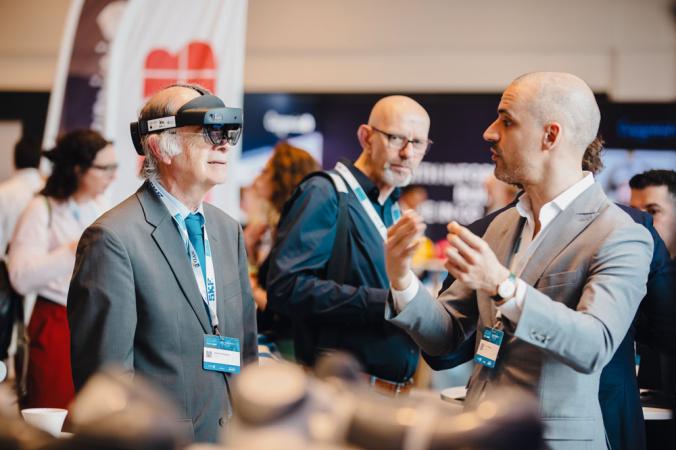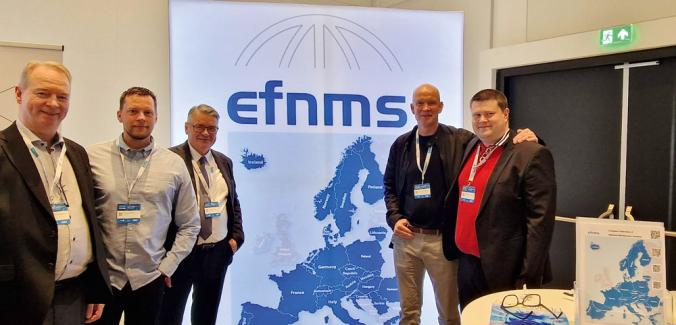The Hellenic Maintenance Society of Greece emphasizes the social role of maintenance
The Hellenic Maintenance Society (HMS) is headed by an experienced chairman, Mr. George Effraimidis, who has worked in the maintenance industry for over 25 years. As he claims, the maintenance sector characterises him from the professional point of view.
Mr. Efreaimidis´ interest in the field began when he started studying mechanical engineering, and maintenance was a part of an industrial management degree.
Since graduation, Mr. Effraimidis has held various positions in the field of maintenance. Since 2010, he has served as General Manager in Atlantis Engineering. The company operates in the field of software maintenance services and is responsible for TPM, Maintenance Management and CMMS implementation projects in Southeast Europe and the Middle East.
– Greece is a natural border of Europe with Asia but also is considered a commercial bridge between Europe and the Middle East. Our traditions and history are very close to the world in the Middle East, and we understand each other's way of acting and thinking, Mr. Effraimidis says.
This is why he sees it natural to develop relations with the Arab world in the maintenance sector as well. During Efreaimidis ’presidency, HMS has been attending OMAITEC, an annual maintenance conference in the Middle East for four years now.
– We can understand both and help connect the two worlds in a unique way, Mr. Effraimidis sees.
According to Mr. Effraimidis, the biggest differences are in maintenance needs.
– Nowadays Arab world is characterized by its spectacular and extensive infrastructure, such as airports, ports, numerous buildings and skyscrapers, and less by its industrial sector.
As a result, the maintenance needs and the facility management challenges are remarkable.
HMS is aware of its responsibilities and actively provides information on the industry
The Hellenic Maintenance Society was founded in 2007, but even before that, an annual maintenance conference “Maintenance Forum” was held in Greece, paving the way for the establishment of Greece’s own Society.
One of HMS's tasks is to contribute to the construction and maintenance of the entire society. The aim is also to strengthen the Greek-speaking maintenance community. According to Mr. Effraimidis, HMS is constantly working to develop networking and connect universities and other research institutes with maintenance service providers.
The main objectives of the maintenance association are based on the consulting. The aim is to collect and disseminate information to everyone who needs it, for example through the association's website.
– Within 15 years, HMS has grown into a strong and active community in the field of maintenance. There are more than 300 active members, including several corporate members from the industrial sector, says Mr. Effraimidis.
–We have a broad role as an operator in the maintenance industry and we have a responsibility for the entire maintenance community. That is why we strive to improve our Society by providing information not only to our members but to everyone.
The association is active for its members by organizing at least six webinars a year on various maintenance issues, from technology to management.
– As our goal is to pass on information to everyone who needs it, we strive to keep the webinars free not only for our members but also for everyone who works with maintenance, says Mr. Effraimidis.
HMS is also systematically involved in collecting maintenance legislation, for example to improve safety and employment issues.
In matters of employment, the association also is about to co-operates with recruitment companies and provides information on vacancies in the maintenance sector, for example, on its website.
HMS actively participates in international events in the field and is always involved in initiatives for the maintenance community, such as, the Euromaintenance Conference in 2016.
It is worth mentioning that, the most important event is the annual “Maintenance Forum” conference in Greece, which Mr. Effraimidis describes as “a meeting place for the entire Greek maintenance community”:
– At the same time, it is also a meeting place for the international maintenance industry, where experts in the field can discuss and exchange experiences and information on new methods and practices.
HMS agilely adopted new ways of interacting during the pandemic
The Covid pandemic has disciplined the maintenance industry and has been reflected in the association’s operations. Yet the association has not been paralyzed, but events have been taken place in creative and alternative ways, within always the existing restrictions. For example, when the annual “Maintenance Forum” could not be held in the normal way for two years, it has been replaced by online meetings.
There was also a desire to keep the annual museum tradition alive during Covid. HMS usually organizes a New Year's Event at the museum, the program of which includes a tour of the museum, after which the change of the year is celebrated with drinks and food. Because of Covid, the museum was visited remotely this time, as there was no desire to give up the significant event because of the pandemic.
According to Mr. Effraimidis, choosing museum as a place to celebrate is to emphasize the fact that the maintenance sector is a clean job and “the clothes do not smell of oil and show dirt stains”, as he says.
– The museum environment also refers to the Society's “role model” Parthenon. Through it, we want to maintain the idea that we have been able to do valuable maintenance work in Greece for almost 3,000 years, Mr. Effraimidis says.
During the pandemic, the association also organized two webinars on how to protect the industry from Covid.
– We invited doctors and the Chairman of the Occupational Health and Safety Committee to visit the webinar. This allowed us to discuss the situation in Covid in the field of maintenance and hear the latest updates on our work, Mr. Effraimidis says.
New technology enables proactive maintenance
Greece is mostly known for its industrial sector in dairy products and less for its heavy production. Moreover, Greece indeed operates as a natural port and a gateway for Europe, so there are remarkable challenges and needs for the viability of its ports.
From this point of view, among other things, Mr. Effraimidis considers the transition from repair to preventive maintenance to be an important development in the sector.
To this end, data collection and smart solutions need to be further developed. As Mr. Effraimidis sees, people working in maintenance should work with their brains, not by hand:
– I think this issue will be even more important in the future. While technology is developing and the transition to preventive maintenance is being facilitated, we must still not forget that human is at the centre of our work.
– The challenge for the next decades is, therefore, to combine these two parameters: human psychology and new technological possibilities, he says.
New technology enables proactive maintenance
Greece is mostly known for its industrial sector in dairy products and less for its heavy production. Moreover, Greece indeed operates as a natural port and a gateway for Europe, so there are remarkable challenges and needs for the viability of its ports.
From this point of view, among other things, Mr. Effraimidis considers the transition from repair to preventive maintenance to be an important development in the sector.
To this end, data collection and smart solutions need to be further developed. As Mr. Effraimidis sees, people working in maintenance should work with their brains, not by hand:
– I think this issue will be even more important in the future. While technology is developing and the transition to preventive maintenance is being facilitated, we must still not forget that human is at the centre of our work.
– The challenge for the next decades is, therefore, to combine these two parameters: human psychology and new technological possibilities, he says.
Text: Tarja Rannisto IMAGES: HMS, SHUTTERSTOCK











